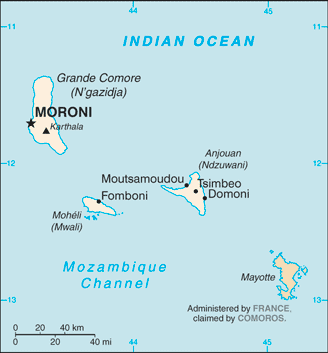Comoros

The Union of the Comoros has an estimated population of 691,400 (UN, 2010). The capital is Moroni. Comoros has an area of 1,862 sq km (719 sq miles). The main languages are Arabic, French, and Comoran (a blend of Swahili and Arabic).
Comoros gained its independence from France in 1975.The country is emerging from a long political and institutional instability. Comoros has experienced more than 20 coups or attempted coups. However, the country has been stable since 2001. Comoros is one of the poorest countries in Africa and relies heavily on foreign aid and remittances from the diaspora.
Women's issues in Comoros are closely associated with tradition, customs and religion, which govern most aspects of the day-to-day life. Women are increasingly playing an active role in politics and decisions making bodies; however, women are still under-represented at the political level, which remains a key challenge for gender equality in Comoros. Violence against women such as domestic violence is widespread in Comoros. In additional financial constraints, and physical and psychological violence, after divorce threaten the rights of women.
- Comoros ratified the Protocol to the African Charter on Human and Peoples' Rights on the Rights of Women in Africa best Known as the Maputo Protocole on the 3rd of March 2004.
- The Convention on the Elimination of All Forms of Discrimination against Women (CEDAW) was ratified by Comoros on the 31st of October 1994.
- Comoros has not yet adopted a National Action Plan on United Nations Security Council Resolution 1325 (UNSCR 1325).
- There are no current or former UN peacekeeping mandates in Comoros.
